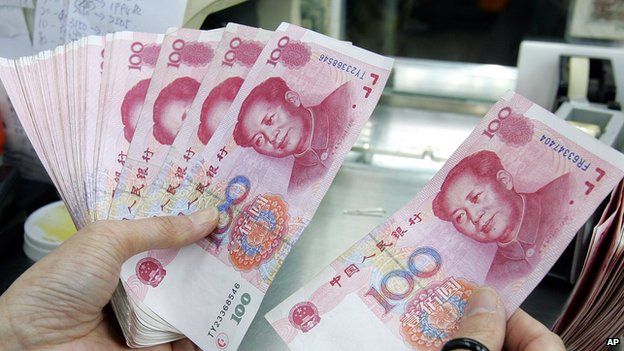China devalues yuan currency to three-year low
By BBC News
China's central bank has devalued the national currency, the yuan, to its lowest rate against the US dollar in almost three years.
The lender said the move was a "one-off depreciation" of 1.9% in a move to make the exchange rate more market-oriented. It comes in the wake of a string of weak economic data from the world's second largest economy.
At the weekend, China reported a sharp fall in exports and a slide in producer prices to a near six-year low in July.
Exports fell by 8.3% in July, far worse than expected and the producer price index was down 5.4% from a year earlier.
The midpoint for the yuan is now set at 6.2298 to $1, up from 6.1162 yuan on Monday.
The People's Bank of China (POBC) manages the rate through the official midpoint, from which trade can rise or fall 2% on any given day.
Market-based rate
Until now, it had been determined solely by the central bank itself.Making the rate more market-based will mean the midpoint will now be based on overnight global market developments and how the currency finished the previous trading day.

China has long kept tight control of the yuan value on concerns over financial volatility and losing its policy control.
Yet it is also under pressure to reform its currency policy as it pushes to become one of the International Monetary Fund's "special drawing rights" (SDR) reserve currencies.
These are currencies which IMF members can use to make payments between themselves or to the Fund.
'A new currency war?'
Analysts ask, though, whether this really is a one-time move from China."The question on everyone's mind is whether this is the awakening of the dragon - ushering in a new global currency war?" Angus Nicholson, market analyst with trading firm IG wrote in a note.
"If this move ushers in a new era where the CNY [Chinese yuan] fixing is increasingly reflective of the spot market, it could be positive for its prospects being included in the IMF's special drawing rights basket of currencies this year."
Asian equities outside of China slipped on the news as investors weighed the implications of the surprise move.
Analysis: Robert Peston, BBC economics editor
The decision of the People's Bank of China to devalue the yuan by 1.9% will have global ramifications, in the short, medium and long-ish term.Immediately it will increase the competitiveness of China's exports at a time when the country's economy is growing at its slowest rate for six years - and when many economists fear that the slowdown will become much more painful and acute.
And for all the spur to growth it may give, the devaluation will reawaken concerns that Beijing is still a million miles from having re-engineered the Chinese economy to deliver more balanced growth based on stronger domestic consumer demand.


0 Comments:
Post a Comment
Subscribe to Post Comments [Atom]
<< Home